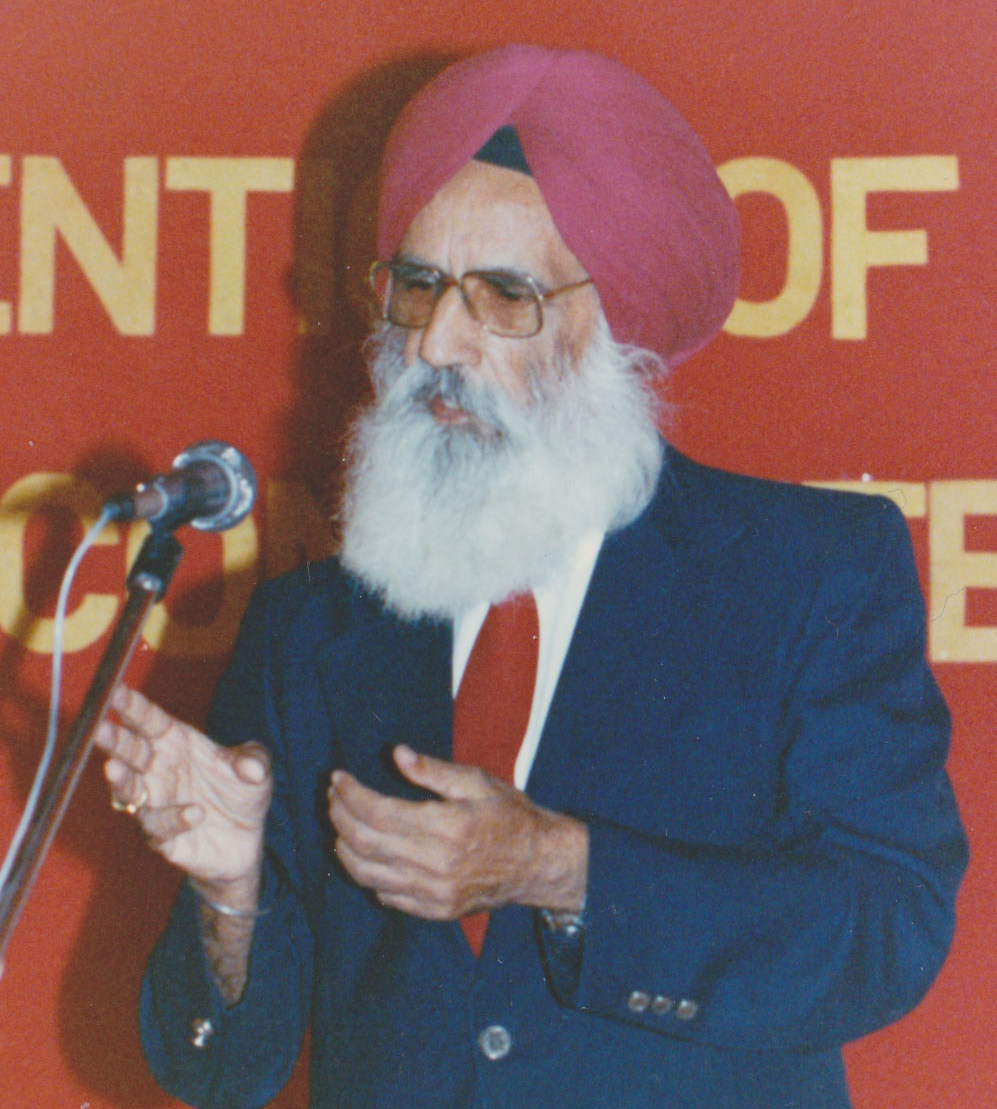In Memoriam

Ajit Singh Bains
1922-2022
A great judicial figure, Ajit Singh Bains, passed away peacefully in Chandigarh, Punjab on February 11. Words of grief and admiration are pouring in from all over the world.
Ajit Singh was born to a patriotic family of Mahilpur, Hoshiarpur district, Punjab, one hundred years ago, in 1922, when India and the world were living a period of momentous changes. His own youth was lived in the conditions of the fight against British rule. His father, Gurbakhsh Singh, was continuously in prison, tortured and forced to live underground because he fought the British. He later became Sarpanch of Mahilpur, in which capacity he made sure not a single killing took place in Mahilpur during Partition and that Mahilpur always took the high road.
His mother courageously raised him and his six siblings without their father, imbuing them with patriotic traditions and the culture of the people. Despite their own meagre rations, she always kept a serving of food, should a traveller require refuge during the night. She encouraged her children to study, with Ajit earning a graduate degree despite the difficulties and the girls attending college, the first women to go to Khalsa College in Mahilpur and earn their own living thereafter.
His parents’ courage and that of the freedom fighters, their integrity and principled approach to solving the problems of life itself marked Ajit’s life. His support for the family and unflagging emphasis on the importance of education bore fruit in the distinguished careers of his younger siblings, including his illustrious brother Yashdip Singh who scored first in his studies in all of Punjab when he graduated and became an eminent Shakespearean scholar, and Hardial Singh, scientist and fearless Communist leader, and of his daughters, sons and grandchildren.
Ajit began his career as a lecturer in Economics at Khalsa College in Jalandhar. Unable to get tenure because of his progressive politics, he went to law school in Lucknow where his paternal uncle was stationed with the army. During these years he actively participated in the defence of the people’s rights, a feature that characterized his life until he passed away.
He opened a legal practice in Hoshiarpur in 1954, shifting to the High Court in 1961. Justice Bains was elected to the Punjab Bar Council in 1964, and was appointed Deputy Advocate General by the Punjab government. He became chairman of the Punjab and Haryana Bar Council in 1972, and was a Judge of the Punjab and Haryana High Court from 1974 until his retirement in 1984.
The Punjab government appointed Justice Bains to head the Bains Committee in October 1985, with the mandate to review cases of persons under trial and investigation in connection with the political agitation between 1981 and 1985. He was also appointed a member of the Punjab Jail Reform Committee – a position he resigned in protest of the entry of paramilitary forces into the Golden Temple on April 30, 1986 in Operation Black Thunder. Justice Bains protested the actions of the authorities and “black cat” commandos and border commandos, as well as the support provided by those who called themselves moderate Sikh leaders and others who praised the police action for “flushing out terrorists, separatists and anti-faith elements.”
Justice Bains subsequently became a founder and Chairman of the Punjab Human Rights Organization in which capacity he travelled far and wide in Canada, the United States and Europe in 1987 and 1988, lecturing on the situation in Punjab and the violation of human rights there. He gave talks in numerous universities and to professional and community organizations. He also met with legislators of various countries, the International Commission of Jurists in Geneva and news reporters everywhere to give his views on the situation in India.
As a lawyer and later as a justice of the High Court, Justice Bains took up many controversial cases, especially those concerning human rights. He became well known for his integrity, high principles and his refusal of attempts to influence his judgments, including when he made a decision against Beant Singh with a jail term. Beant Singh then became Chief Minister of Punjab and exerted vengeance but he was subsequently found guilty of causing the death of 25,000 citizens for which he was assassinated on August 31, 1995 by two men who were later declared National Martyrs.
Justice Bains wrote many important speeches, pamphlets and the book Siege of the Sikhs in 1988 which provided valuable information and drew warranted conclusions on human rights violations in Punjab. He also wrote an important pamphlet, State Terrorism and Human Rights, while imprisoned in Burail Jail, Chandigarh, in 1992. He was kidnapped, abused and detained without remedy from April 3, 1992 until August 19, 1992 when the authorities were forced to release him due to national and international outcry. In that pamphlet he gives an unsurpassed definition of individual and state terror, highlighting how states use terror as a method to undermine just struggles, whether armed or unarmed.
Throughout Ajit Singh’s long and productive life of service to the Indian courts and following his retirement, he maintained close and affectionate family ties. He passed away much loved and respected, a true son of the brave people of Punjab.
Hardial Bains Resource Centre
secretariat@hbrc-crhb.org
ShareThis